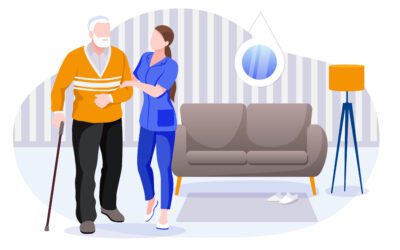March 14-20 is National Sleep Awareness Week, with a goal to raise awareness about the health benefits of sleep. It’s no coincidence that the campaign begins at the start of Daylight Saving Time, when many Americans “spring forward,” losing an hour of sleep.
According to the National Sleep Foundation, sleep is crucial to overall wellbeing. It recommends 7-9 hours of sleep for adults 18-64, and 7-8 hours of sleep per day for adults over the age of 65.
For many, a sleepless night is an occasional irritant that throws us off our ‘A’ game. Anyone may experience sleeplessness from a variety of psychological, physical, and environmental causes. However, it’s common for adults to experience changes in sleep patterns as they age, routinely disrupting their circadian rhythm and affecting their level of alertness and overall wellbeing.
Sleep Issues for Aging Adults
While consistent, quality sleep provides great benefits to everyone, a lack of sleep can have serious consequences for aging adults. Here are some examples:
- Dementia: Studies show that older adults with dementia commonly struggle with sleep disturbances. This alone can exacerbate their cognitive decline, contributing to the advancement of Alzheimer’s Disease, for instance.
- Immune System: A healthy sleep regimen can prevent illness. Chronic fatigue breaks down the body’s immune system, leaving it vulnerable to infection. Quality sleep can also help vaccines, such as those for coronavirus or influenza, to work better in your body if you get enough sleep before you are vaccinated.
- Falls: Older adults suffering from a lack of sleep are at greater risk for falls, as they are less capable of preventing falls when tired, particularly if fatigue is a chronic issue.
- Chronic pain: A study published in the U.S. Library of Medicine (National Institutes of Health) reveals that improved sleep habits can decrease chronic pain over time.
- Cardiovascular health: Sleep disorders, particularly shorter durations of sleep, are associated with increased risk of hypertension, stroke, coronary heart disease, and diabetes in older populations. There can also be too much of a good thing. Research study participants reporting sleeping for longer durations (10 or more hours of sleep per day) had a 77 percent higher risk of cardiovascular-related deaths than those reporting 8-9 hours of sleep.
- Parkinson’s disease: Individuals diagnosed with Parkinson’s disease often experience excessive fatigue throughout the day, and still have difficulty falling or staying asleep. Like those who suffer from dementia, this is a “Catch-22” (paradox), as it is essential that they get more sleep to allow their body enough time to repair and restore itself.
Tips to Improve Sleep
There are many good habits that can improve your quality of sleep naturally, helping to avoid the negative impact of poor sleep habits. Have you tried everything on this list?
- Keep moving. Daily exercise, such as walking, swimming, or yoga significantly improves sleep quality.
- Eat well. Eating a consistent, healthy diet and avoiding meals too close to bedtime can improve sleep, according to the Duke Health & Wellbeing Nutrition Team.
- Stick to a routine. Going to bed and waking up at the same time each day improves your chances of uninterrupted sleep.
- Turn everything off. You can’t rest peacefully if your mind is still scrolling through emails, to-do lists, scary movies, negative news stories, or social media.
- Relax. Create a bedtime routine that helps to relax you, whether it’s taking a warm bath, reading, meditation, or listening to calming music. Ensure the room is cool and dark when you’re ready for lights out.
At the Glencroft Center for Modern Aging, residents enjoy healthy, nutritious dining options, access to a fully-equipped fitness center, indoor pool, walking trails, stimulating activities, and a relaxing environment. Visit glencroft.com to schedule an in-person tour, or take a virtual tour now. You may also schedule a tour by calling (623) 939-9475.
Follow Glencroft on Facebook, Twitter, LinkedIn, or Instagram for more successful aging tips, resources, and updates.






